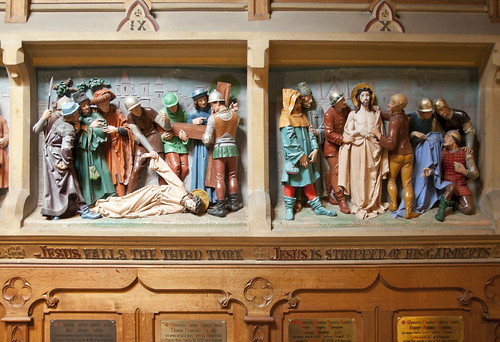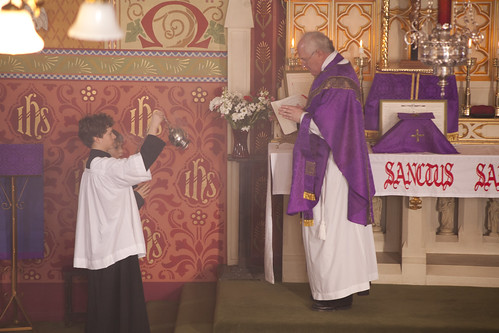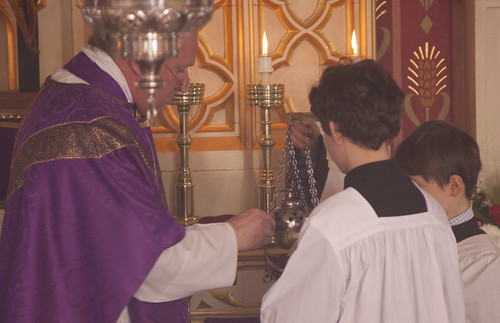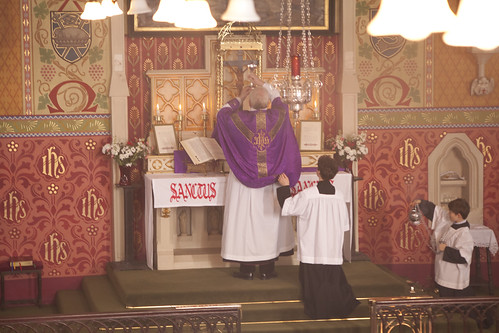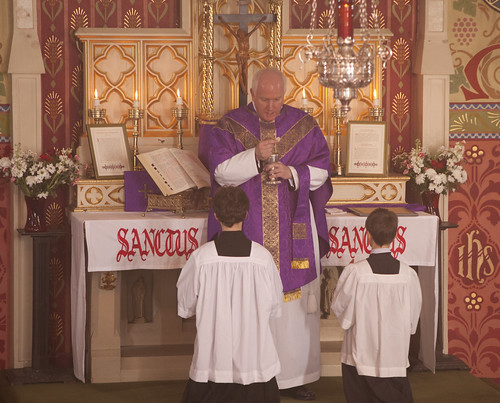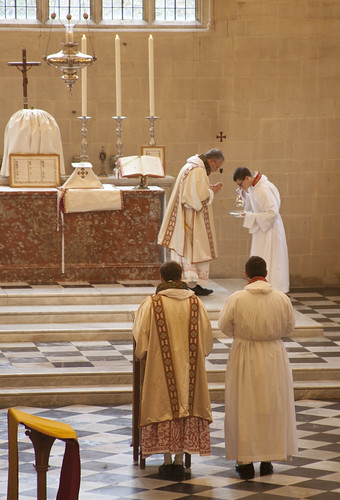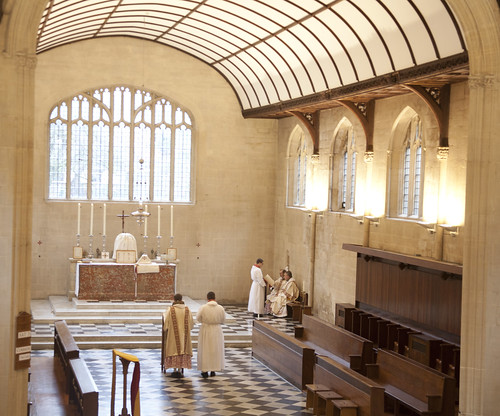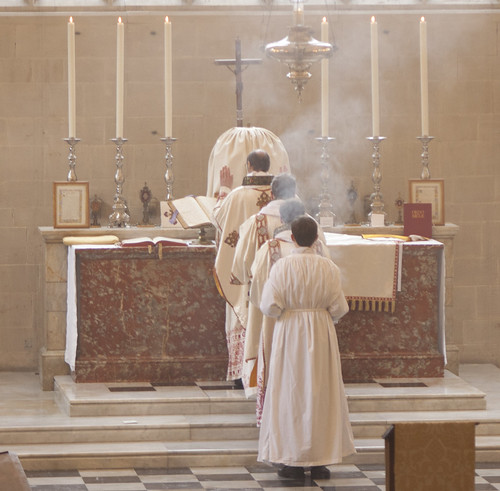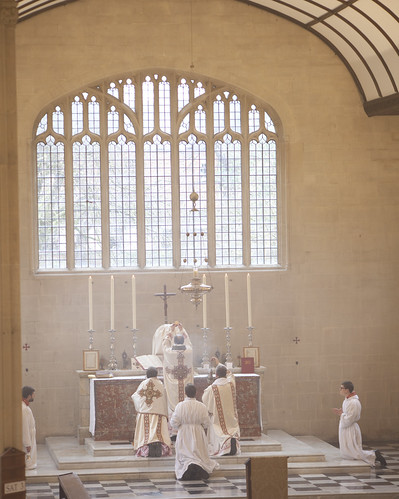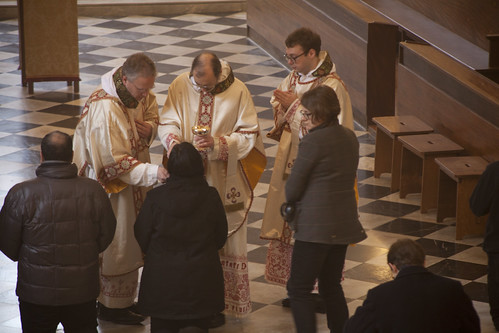Chairman's Blog
Prayers for Persecuted Christians
 |
| The Arabic letter 'Nun', for Nazarene, is being painted on Christian homes in Mosul, to mark them out. |
I posted this in July 2014 for the Christians of the Middle East. Today I repost it with the thought particularly of the Catholics of China.
--------------------------------------------------
At this moment of disaster for the Christians of Mosul, and of the Middle East in general, we should remember to keep them in our prayers, and have Masses said for them.
There are several Votive Masses and Commemorations in the 1962 Missal for suitable intentions ('For the Church', 'Against Persecutors', 'For Peace' and the like). The Collect of one of them was enriched with an indulgence in 1934, for use as a prayer on its own. The indulgence has gone but we can still say the prayer.
Graciously hear the prayers of Thy Church, we beseech Thee, O Lord: that her enemies and all heresies be brought to nought, and that she may serve Thee in perfect security and freedom. Through Christ our Lord. Amen.
Ecclesiae tuae, quaesumus, Domine, preces placatus admitte: ut, destructis adversitatibus er erroribus universis, secura tibi serviat libertate. Per Christum Dominium nostrum. Amen.
(Translation from the Raccolta, the official handbook of indulgenced prayers.)
The Raccolta also includes this short prayer, taken from the Roman Ritual:
That Thou wouldst vouchsafe to bring low the enemies of holy Church, we beseech Thee to hear us.
Ut inimicos sanctae Ecclesiae humiliare digneris, te rogamus, audi nos.
A longer prayer, which isn't in my edition of the Raccolta but which was also granted an indulgence in 1934, was issued as a Prayer Card by the Catholic Truth Society with an imprimatur from Cardinal Godfrey in 1962.
Almighty, everlasting God, look with compassion on all those who suffer persecution for justice’ sake.
Grant them grace to carry their cross with patience in the name of Thy beloved Son, our Lord and Saviour Jesus Christ.
Let the chalice pass from them is such by Thy holy Will: yet, in all things, may Thy Will be done.
Grant to those who persecute, light to see the truth, and the grace of mercy and forgiveness, for they know not what they do.
Mary, Mother of Jesus, Comfort of the Afflicted, help thy children in their time of bitter trial.
O Lord our God, by the sign of Thy holy cross deliver us from our enemies.
Support the work of the LMS by becoming an 'Anniversary Supporter'.
The sexual revolution devours the young
Between 2012 and 2015, 600 rapes were recorded in UK schools. “Why didn’t you stop when she was crying?” a teacher asked a 14-year-old perpetrator. “It’s normal for girls to cry during sex,” he replied.
Blanche Girouard, basing herself partly on a report published last September in a pithy piece in Standpoint magazine on the sexualised nightmare many schools have become. Don't click on the links if you are of a sensitive disposition.
Girouard argues that we need to see the difference between normal flirtation and violent sexual assault, and that children need to be educated in this difference also. It doesn't sound much to ask, but the 'me too' phenomenon, and the heavy-handed policing of sexism in schools, seems determined to blur the distinction. It is true that flirtation coming from a person with great power over the other party, as has been the case with Weinstein and others, is a serious matter, but it is still different from a violent sexual assault. And the 'me too' hashtag has not been limited to such cases.
If super-sensitivity to imagined sexist slights is not the answer to sexual violence, what is? It is to be hoped that the argument that adults have a right to pornography (or that it imbues them with nice, liberal attitudes) will be worn down by its hideous social cost, but pornography is only part of the picture. Why are children looking at pornography? Yes, it is available, but their access to it speaks of something wrong in the home. Why are they using it as the basis of their relationships? Yes, it has a dark allure, but it is most attractive to children who don't have much else. Boys and girls are both, in their different ways, particularly vulnerable if they don't have fathers in the home. The wider picture is of family breakdown and a collapse of values.
Hashtags cost little, and acheive less. Who wants to campaign to make divorce harder and dis-incentise single parenthood? It won't make you popular. But unless we start talking about it, this problem is not going away.
See also my posts:
'What exactly is wrong with Sex Ed for four-year-olds?'
'Sex education and sexual exploitation'
Support the work of the LMS by becoming an 'Anniversary Supporter'.
The Spring 2018 Mass of Ages is here!
Mass of Ages - Spring 2018 Edition
 Mass of Ages is the quarterly magazine of the Latin Mass Society. It contains reports on our many activities across the country, national and international news of Traditional Catholic events, feature articles on different aspects of traditional Faith and culture, and opinions and views on developments in the Catholic Church.
Mass of Ages is the quarterly magazine of the Latin Mass Society. It contains reports on our many activities across the country, national and international news of Traditional Catholic events, feature articles on different aspects of traditional Faith and culture, and opinions and views on developments in the Catholic Church.Read Caroline’s complete article, which is accompanied by pictures of the Solemn High Mass for All Souls in the Basilica of Our Lady of the Rosary, Cardinal Burke in cappa magna and a group photograph with Cardinal Burke, Msgr Wach and other priests of the Institute.
‘A programme of restoration’, LMS Chairman, Joseph Shaw, looks at two models for the life of the Church.
Chris Rayment has written an obituary for Timothy Fawcett Wood, sometime Latin Mass Society
Local Representative and Committee member, who died on 28th September 2017.
Philip Goddard looks at the life of a remarkable English scholar - St Alcuin of York.
Our Macklin Street column promotes our online shop and encourages members to sign up to Gift Aid and Direct Debits.
• Alberto Carosa reports on how Nordic Catholicism is growing
• In her Art and Devotion series, Caroline Shaw looks at The Presentation in the Temple by Philippe de Champaigne
• Mary O’Regan on the fear of speaking out
• Paul Waddington visits one of Preston’s most interesting churches, St Thomas of Canterbury & English Martyrs, Preston, to which the LMS will make pilgrimage in May.
• A priest of the Birmingham Oratory explains the Polish folk art called ‘pisanki’, the tradition of decorating eggs for Easter
• Fr Bede Row asks, “Do we still believe in Parishes?”
• The Lone Veiler on ‘The joys of tradition’.
Support the work of the LMS by becoming an 'Anniversary Supporter'.
Masses in Hethe cancelled
With immediate effect the Traditional Mass at 12 noon in Holy Trinity, Hethe, has been cancelled, and until further notice.
If the situation changes I will post again on this blog.
Support the work of the LMS by becoming an 'Anniversary Supporter'.
A question for Freemasons
 It seems the Chief Executive of the Grand Lodge is complaining about Masons being discriminated against, and wants to have a public campaign to answer people's questions.
It seems the Chief Executive of the Grand Lodge is complaining about Masons being discriminated against, and wants to have a public campaign to answer people's questions.
However he wouldn't show the BBC the secret handshake, shucks. No doubt there are thousands of YouTube videos which will.
About them being misunderstood and disliked, I can understand what he means. Misunderstood, because they swear ridiculous oaths (only marginally less ridiculous without the blood-curdling threats) not to reveal what any interested person can find out from any number of books, about Masonic rituals and their symbolic meanings.
Disliked, because the main point of freemasonry for the last century and a half, for the overwhelming majority of its members, has been being on the inside of a club which supposedly favours its members, in business and in other ways. I don't know to what extent this runs against the interests of shareholders, or non-masonic employees and customers; perhaps it doesn't happen at all. I just know that this is what everyone thinks, including the mason who once tried to recruit me. And that doesn't really warm the hearts of non-members towards the organisation.
What would I like to ask the Freemasons? I suspect a lot of questions are going to run into the problem the BBC has about the handshake: that members can't talk about what everyone else can discuss as much as they like, namely the rituals. It is the rituals which embody whatever moral and quasi-religious character Freemasonry can lay claim to. But since there's no mystery about them I suppose we're not so much worse off without members' own opinions. I'm sure most don't pay them much attention, any way.
But here are some questions. It's not that I need to know the answers, which are obvious; it's that I'd like Freemasons face the problems which they raise.
- Is it not blasphemous to refer to God by a name, Jahbulon, which incorporates the name of the heathen deity Baal?
- Is it not 'rash swearing' to take oaths to protect 'secrets' which, Masons tirelessly tell us, are of no real importance, and which, as a matter of historical fact, are widely known by interested non-members?
- Is it not incompatible with any major religion to regard it as a matter of indifference which religion is true?
It is for such reasons that Catholics are forbidden by the Church and, indeed, by Divine Law, from becoming Masons.
I get the impression that Freemasons are either frivolous about their membership, in which case they don't want to think about the implications of these questions, or extremely defensive, in which case they will refuse to admit there are any implications.
But hey, surprise me!
Follow the Freemasonry label on this post to see my discussion of a couple of useful books about it.
Support the work of the LMS by becoming an 'Anniversary Supporter'.
More on Men and Women at Mass: the Hebrides
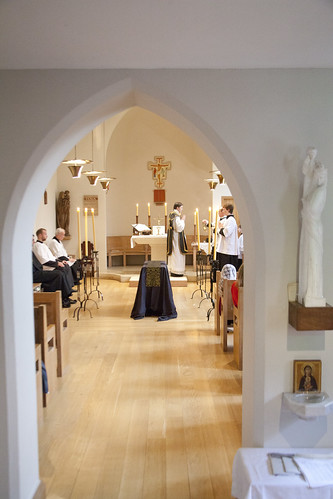 |
| A Traditional Requiem Mass in the chapel of St Benet's Hall, Oxford, in 2015. On the right the small statue is a scale model of 'Our Lady of Isles', a huge statue constructed on Catholic South Uist in the Hebrides in 1958. The model is I believe a working model made by the artist, Hew Lorimer. |
I've been reading about the Church in the Scottish Highlands and Islands. Here is something worth sharing. Fr Allan MacDonald, Parish Priest in the Scottish Hebrides in the late 19th century, was a Gaelic speaker and a great collector of folklore. I quote John Watts, the historian, referring to Fr MacDonald's notebooks (which have been postumously published, in part):
(I've discussed Brown's thesis in more detail here.)
Support the work of the LMS by becoming an 'Anniversary Supporter'.
Holy Trinity Hethe welcomes Fr Anthony Talbot
As of the beginning of January Fr Anthony Talbot has been celebrating the Traditional Mass in Holy Trinity, Hethe, outside Bicester (Hardwick Road, Hethe, OX27 8AW). After a period of having a rota of priests coming from different places it is good to have a single pastor again, in this beautiful historic church.
We are very grateful for the priests who between them covered the gap between Fr Paul Lester and Fr Talbot, while the Presbytery was being refurbished and was uninhabitable. This maintained the Sunday provision established by Fr Lester three years ago.
The Traditional Mass in Hethe is celebrated every Sunday at 12 noon. On the second and fourth Sundays of the month it is a Missa Cantata. We are also planning some occasional Masses with polyphony.
Support the work of the LMS by becoming an 'Anniversary Supporter'.
A Dominican Mass for St Thomas Aquinas
The Schola Abelis sang for a High Mass in the Dominican Rite at Blackfriars, Oxford, last Saturday.
This Mass, celebrated just because the various people involved - singers, Dominicans - simply thought it would be rather nice, attracted fifty people. These Masses now happen near the beginning of each University Term.
It was celebrated in honour of St Thomas Aquinas, whose feast day is this term (on different dates in the old and new calendars).
It is one of the great privileges of involvement in the Latin Mass Society that we can facilitate such devotional occasions. The LMS is about making good things happen! Although I must apologise for the inactivity of this blog, my time has in part been taken up with future events which will be advertised and reported here.
Support the work of the LMS by becoming an 'Anniversary Supporter'.
The Statistical decline of the Church
Inspired by some discussion on Twitter about the Church's failure to oppose the legalisation of abortion in the 1970s, effectively, I'm reposting this from April 2013. And with apologies for not posting for so long.
 |
| Counter-cultural young ladies at the Family Retreat |
As I wrote in the last post, contrary to the gremlins which have falsified the figures for mid-century ordinations in England and Wales on the Vocations Office website, the Catholic Church was riding high by every conceivable measure in the middle of the 20th century. Figures for ordinations and the like peak in or shortly after the 1960s. This is true all over the West: outside the Communist bloc, throughout Europe and North America. Vatican II and the subsequent reforms took place at precisely the time the decline commenced. QED.
Actually, it is not as simple as that. For the Church's difficulties coincided with very similar problems for a whole range of other organisations. As I have blogged before, membership organisations of all kinds grew rapidly in the first half of the 20th century, and began to decline in the 1970s. Not only that, but a number of other measures of 'social capital', such as whether people trust strangers or know their neighbours, rose and declined in exactly the same way. It is an extraordinary phenomenon.
 |
| A public sign of penance, on Ash Wednesday in Oxford |
Previously I blogged about how commuting times and television have made it much harder to get people to come to face-to-face meetings, which were so characteristic of life in the mid-century: clubs and dinner parties, or of course sodalities and parish groups. Another important factor is the increased female rate of participation in the workforce: women who didn't go out to work had more time to maintain the social fabric of their communities. These go some way to explaining the decline of the Freemasons, poker-playing clubs, and what have you.
At least to some extent, trends of church-going can be explained in the same way: people don't want to spend their time in that way. And church-going has declined across the denominations.
Can the difficulties of the Catholic Church be put down to social factors, then? No. The explanation won't work.
 |
| Counter-cultural young men, Good Friday with the FSSP in Reading |
Robert Putnam's great study of this phenomenon, 'Bowling Alone', looks with great care at all sorts of correlations to see what can explain the general decline of what he calls 'social capital'. TV, commuting, and female participation in work are all important factors, in that order. His figures show, interestingly, that Americans, at least, don't work longer hours, or move house more frequently, than in former decades, so those factors can be set aside. But there are two other issues: one is a huge correlation to the baby-boom generation. The other is that his efforts leave about 20% of the shift in behaviour unexplained.
Looking at what people did when at the age of 20, 30, 40, or 50 allows us to detect changes in behaviour between generations: people who were 20 in 1975 behaved differently from those who were 20 in 1955, and so on. Putnam says the baby-boom generation, coming of age in the late 1950s onwards, are less sociable: they do less of all the 'social capital' things he is interested in, including church-going. This observation is not exactly an explanation: why did they behave differently? The closest Putnam comes to an answer is 'values'. Annoyingly, he doesn't compare his results with surveys of social attitudes; perhaps comparable historical data does not exist. But he must be right: there was an ideological shift.
This would also explain the 20% gap of explanation in everyone else. Why, says Putnam, do even those people living essentially 1950s lifestyles in the 1980s - wife not going out to work, living in a small town, not watching TV morning noon and night, etc. etc. - why do even these people, once statistically isolated, still show declines of church-going, dinner-party giving etc.? Well, if the baby-boomers had a distinct ideology, it is hardly surprising that even some of the older generation picked this up to an extent as time wore one.
 |
| Putnam's summary pie chart, from 'Bowling Alone' p284. |
(Putnam's pie: 'Work' includes women going to work; 'Sprawl' includes commuting to work and also to less local shops. The overlap between TV and 'Generational Change' is the difference made by growing up with TV in explaining why the younger generation is less socially engaged. Other factors, which Putnam attributes vaguely to 'values', explains the rest of the 'Generational Change' segment. 'Other' is the part he can't explain at all.)
In other words, the 'social change' explanation of the Church's decline gives a very large space for change as a result of changing values or ideology, as well as things like commuter times and the invention of the telly. We cannot say that the Church is simply a victim of this change, because, particularly looking back to the mid century, the Church is a major player in the formation of values. And as we all know, one of the effects of the 'Spirit of Vatican II', in the lead up to the Council and after it, was a deliberate policy of not resisting the values of the new generation.
 |
| Canon Meney ICKSP joins the Walsingham Pilgrimage last year. |
It is true that other churches were also effected. But then other churches took very much the same line, for similar reasons and at the same time.
The 1960s saw a social revolution which was fundamentally hostile, not only to the Church, but to all kinds of institutions essential to social cohesion. It was precisely this moment which the Church chose to give up, or seriously tone down, its campaign against these values. The new values could, I suppose, be summarised as materialism, or alternatively an interest in crack-pot spirituality (or sometimes both); and an individualism which rejected all kinds of rules. On the one hand, the Church seemed to be doing extraordinarily well, with full seminaries and lots of converts over the previous decades; on the other, there was great pressure to let people off the leash a bit. So the Church (speaking loosely) did what schools, universities, professional associations, governments and religious groups of all kinds did: let things hang out a little.
I don't think it was the Holy Spirit. The fruits of it speak for themselves. Now we are picking up the pieces, Bl. Pope John Paul II and Pope Benedict have had to remind us that the Church must be counter-cultural. We can't afford to accommodate the culture of the day, because it is hostile to the Faith. We must stand up against it, and teach our children to stand up against it. We need to do, in fact, what was second nature to the Church before the Second World War, which also existed in a hostile environment, not so much one of hedonistic materialism but of anti-Catholic bigotry: we have to make sure we have a completely secure grip on the facts and arguments of the Faith, conform ourselves to Christ, and put up with the enemies of the Faith ridiculing us for it. And this is something we can and must do in the liturgy itself.
 |
| Bishop Rifan at Mass for the LMS Pilgrimage to Holywell, North Wales |
Let me end with two quotations.
Pope Benedict:
It may well be that kneeling is alien to modern culture—insofar as it is a culture, for this culture has turned away from the faith and no longer knows the One before whom kneeling is the right, indeed the intrinsically necessary gesture. The man who learns to believe learns also to kneel...
the liturgy, though it must always be properly inculturated, must also be counter-cultural.
See the FIUV paper on Western Culture.
Prior of Norcia to celebrate Candlemas in London
Support the work of the LMS by becoming an 'Anniversary Supporter'.

